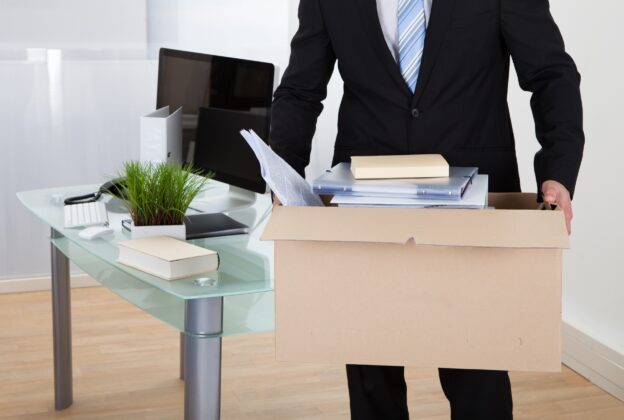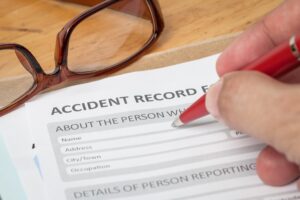Can I be sacked for having an accident at work? What if it wasn’t my fault? Could I get disciplined for making an accident at work claim?
If you’ve been injured at work, these are all questions that might be on your mind. In this guide, we’ll discuss when your employer can legally dismiss you after having an accident at work and when they cannot.
If the accident wasn’t your fault, you might be interested in making a compensation claim but are worried that this could jeopardise your job. Additionally, we’ll talk about your rights after suffering an accident at work, and whether or not you could lose your job for claiming compensation.
Following this, we’ll touch on whether or not you are entitled to sick pay after suffering an injury in a workplace accident.
We hope our guide will answer any questions you might have about whether or not you can get sacked following an accident at work, but if it doesn’t, our team of advisors are here to help. Contact us today to get started or to learn more about making a personal injury claim:
- Contact us online
- Call us on 0330 0432925
- Use the live chat
Can I Be Sacked For Having An Accident At Work?
You can’t be legally fired for being ill or injured, nor can you lose your job for an accident that wasn’t your fault. If you are, this could be seen as unfair dismissal.
However, if the accident occurred because you acted negligently, you can be sacked for this. For example, if you came into work drunk and caused a pallet truck accident, this could be seen as gross misconduct, and your employer could legally fire you.
Keep reading to find out, “Can I be sacked for having an accident at work and making a claim?”.
Can I Be Sacked For Having An Accident At Work And Claiming Accident At Work Compensation?
No, you can’t be sacked for taking legal action and making an accident at work compensation claim. Whether you work in an office or in a warehouse, it’s your legal right to pursue compensation after suffering an injury at work that wasn’t your fault. In the next section, we will discuss when you could be eligible to make a personal injury compensation claim.
If your employer dismisses you because you chose to make an accident at work claim, this could be unfair dismissal. We’ll talk more about unfair dismissal in the next section.
Our team of advisors are here to help if you are interested in making a claim for an injury caused by a breach of health and safety legislation. Contact us today to learn more.
What Can I Do If I Have Been Fired After An Accident At Work?
You have multiple options if you’ve been fired after an accident in the workplace that wasn’t your fault, but we recommend making an accident at work claim.
To make an accident at work claim, you need to be able to prove that:
- You were owed a duty of care under the Health and Safety at Work etc. Act 1974 (HASAWA).
- This duty of care was breached.
- As a result, you were injured.
Under HASAWA, your employer owes you a duty of care, which means they need to take all reasonably practicable steps to help ensure your safety while working. If they fail to do this, and you get hurt as a result, then you may be able to make a claim. For example, if your employer provided you with no training on how to operate a forklift but still made you use one, resulting in you crashing the forklift and suffering injuries, you could be eligible to make a claim for compensation.
Making an accident at work claim can help with the financial strain of being unable to work, as it can cover not only your pain and suffering but also financial losses and lost earnings.
What Is Unfair Dismissal?
Unfair dismissal happens when you are wrongfully sacked, or if your employer doesn’t follow the proper procedures when letting you go. In some cases, you may be able to make an unfair dismissal claim. To get more help surrounding unfair dismissal, you can check Acas, the Advisory, Conciliation, and Arbitration Service.
Contact us today if you have suffered an injury in a workplace accident and would like to know if you could make a compensation claim.
Am I Entitled To Sick Pay After An Accident At Work?
Sick pay can depend on the company you work for. Some companies offer full pay to cover sickness, some offer half pay, and some do not provide sick pay at all as it is not a legal requirement to provide this. Check your contract to find out your company’s policies.
However, if you are classed as an employee, earn an average of £123 a week and have been sick for more than three days, you may be eligible for Statutory Sick Pay (SSP). You can claim SSP for up to 28 weeks.
If you make a accident at work claim that is successful, you can still claim for loss of earnings even if you’ve been receiving SSP. Contact our team of advisors today to learn more.
Contact Us To See If You Can Claim For A Workplace Injury
When you make an accident at work claim, you don’t need to work with a solicitor. However, it’s highly recommended, and it can make the process seem a lot less stressful and less complex.
When you work with a solicitor, they can use their years of training, education, and expertise to help with:
- Explaining legal terminology.
- Providing you with free legal advice.
- Filing your claim within the time limit.
- Presenting your claim in court.
- Communicating with the other party.
- Making sure all your losses are covered by your settlement.
- Negotiating a final compensation amount.
Our panel of accident at work solicitors can help with all of this on a No Win No Fee basis. They are experts in personal injury claims, and work under the terms of a Conditional Fee Agreement (CFA), which usually means that:
- You don’t pay for their work upfront or as the claim is ongoing.
- You don’t pay for their work at all if the claim fails.
- You pay a success fee if the claim succeeds. This is a legally limited percentage taken from your compensation.
Contact Our Team
We hope our guide has answered the question, “Can I be sacked for having an accident at work?” but if you still need more information, a member of our team can help.
Get in touch today to ask questions, talk about the claims process, and find out if you could be entitled to claim compensation with a personal injury solicitor from our panel by:
- Contacting us online
- Calling us on 0330 0432925
- Using the live chat
Learn More About How To Claim For A Workplace Injury
For more helpful accident at work guides:
- Learn more about forklift accident compensation claims.
- Find out how to claim for a crane accident at work that left you injured.
- Get help with making a hand injury at work claim.
Or, to get more helpful information:
- Learn when to call 999 from the NHS.
- Find out how to request CCTV footage of yourself with information from GOV.UK.
- Read about health and safety basics from the Health and Safety Executive (HSE).
Thank you for reading our guide on ‘Can I be sacked for having an accident at work?’. If you have any further questions or would like help with making a personal injury claim, you can contact our advisors.











